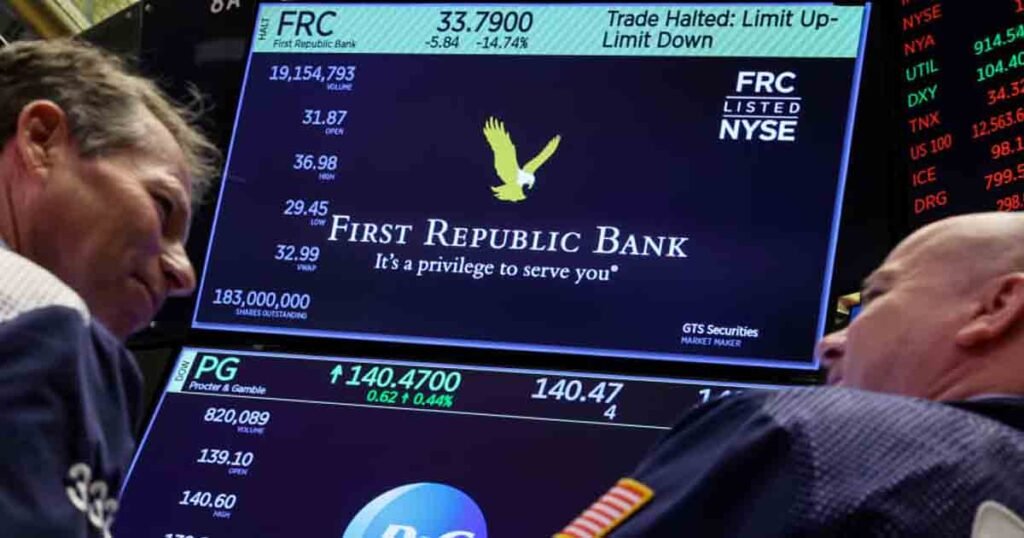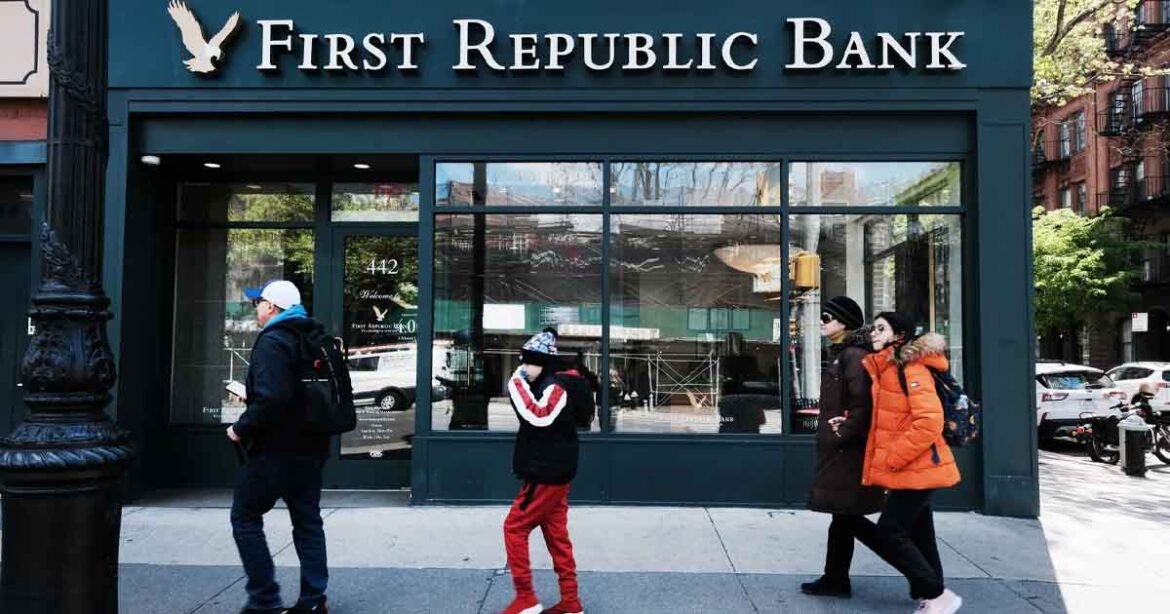The failure of First Republic Bank of the USA brings the total number of major American bank failures this year to three, evoking unsettling comparisons to the global financial crisis of 2008.
First Republic, a regional bank in the United States, was formally closed by regulators and sold to JPMorgan Chase, making it one of the largest bank failures in American history. First Republic had a difficult time surviving after two other institutions failed last month, frightening investors and depositors, as their assets were pummeled by the rise in interest rates.
First Republic confronted the extreme deposit withdrawal after disclosing the previous week that customers withdrew approximately $100 billion in deposits in response to the turmoil surrounding the failure of Silicon Valley Bank. As investors grew increasingly concerned that the bank would fail, the bank’s share price dropped by 50 percent in a single day.
The collapse of First Republic Bank
From a high of $4 billion in November of 2021, its market cap has fallen all the way to $557 million. First Republic held $213bn in assets at the end of 2022, of which approximately $167bn were loans and $32bn were bonds. It was financed by $176 billion in deposits, $7 billion in short-term financing, and $9 billion in long-term financing.
The bank also had $18 billion in capital of high quality. By the end of the first quarter, the company had lost $102 billion in deposits. This has been replaced by a massive amount of short-term borrowing, which rose to $80bn by the end of the first quarter, and by $30bn of pity deposits from six large banks, which placed funds with the institution to give it a lifeline.
Despite receiving a $30 billion lifeline from 11 of the nation’s largest banks in March, First Republic failed. It will be marked as the second-largest U.S. bank by assets to fail after Washington Mutual, which faltered during the 2008 financial crisis.
Seven weeks after the government seized control of Silicon Valley Bank and Signature Bank, whose collapses sent a shock wave through the industry and fueled fears that other regional banks were at risk of similar runs on deposits, the government has taken control of, and sold, First Republic.
What went wrong?
It might be hard to believe, but a relatively small bank serving affluent customers in the coastal states, First Republic, became a threat to the American banking system serious enough to prompt the government to cudgel the industry and stage an intervention. The reason has much to do with the high-net-worth individuals who bank there, as well as the fact that the majority of depositors are unpredictable and volatile.
In addition, First Republic had loaned a substantial amount of money when interest rates were low, including through inexpensive mortgages. First Republic had resorted to short-term funding, the majority of which was provided by the Federal Reserve and the Federal Home Loan Banks, another government-backed lender, at market rates. This has likely destroyed its ability to generate a profit.
During the final quarter of 2022, First Republic earned a net interest margin of 2.5%. This represents the difference between what it collected on loans and what it paid for funding. This decreased to 1.8% during the first quarter.

JPMorgan buys First Republic Bank
US regulators were reportedly in a rush to find a buyer for the struggling First Republic Bank, seeking bids from six banks. On Monday, the Federal Deposit Insurance Corporation acquired First Republic and promptly sold it to JPMorgan. The agreement was disclosed hours before the opening of U.S. markets and after frantic weekend negotiations by government officials.
According to a press release, JPMorgan Chase acquired all of First Republic’s deposits, including uninsured deposits, and a “substantial majority of assets.” The news caused a 2.6% increase in premarket trading for JPMorgan shares. The acquisition makes JPMorgan, already the nation’s largest bank, even larger, which could attract the attention of Washington’s progressive Democrats. The next day, 84 First Republic locations across eight states will reopen as JPMorgan offices.
There was no apparent way out for First Republic because depositors hesitated to return. It was unable to recover because net interest margins had collapsed, and selling assets did not assist.
Is Fed reserve’s interest increase responsible for these collapses?
Last month, problems at Silicon Valley Bank heightened concerns about the global banking industry. Over the past year, central banks around the globe have sharply increased interest rates in an effort to reduce the rate of inflation. It has diminished the value of the large portfolios of bonds that banks acquired when interest rates were lower, causing concern that other businesses may face similar circumstances.
First Republic, like the other two failed banks, Silicon Valley Bank and Signature, collapsed under the weight of loans and investments that lost billions of dollars in value as the Federal Reserve raised interest rates swiftly to combat inflation. When it became apparent that these assets were now worth significantly less, First Republic’s wealthy customers, the majority of whom reside on the coasts, began withdrawing their funds as soon as possible, and investors dumped its stock.
The Federal Reserve has acknowledged in a report that it was slow to recognize the strain placed on banks by a sharp rise in interest rates, which has decreased the value of their financial assets despite increasing their profitability. The mismatch has caused panic and a flight of funds to financial institutions viewed as secure havens.
The oversight of mid-sized institutions such as SVB and First Republic was weakened by reforms enacted during Donald Trump’s presidency, according to US central bank officials. After the failure of SVB, Michael Barr, vice-chair of supervision at the Federal Reserve, stated that the US central bank needed to tighten its regulations.
“Federal Reserve supervisors failed to take forceful enough action,” he said, citing regulatory standards were “too low,” a supervision system that lacked urgency, and risks to the broader banking system caused by the lax regulation of mid-sized banks.
What’s next?
The collapse of First Republic could heighten fears of an economic decline. According to industry experts and economists, the turmoil that began with the failure of Silicon Valley Bank has made banks and investors more cautious. Furthermore, this hesitance may increase the difficulty and cost of lending, thereby limiting business growth and employment opportunities. The takeover of First Republic and its repercussions could prompt the Federal Reserve to stall or halt its interest rate increases if it believes the failure will prompt banks to tighten lending conditions further.


